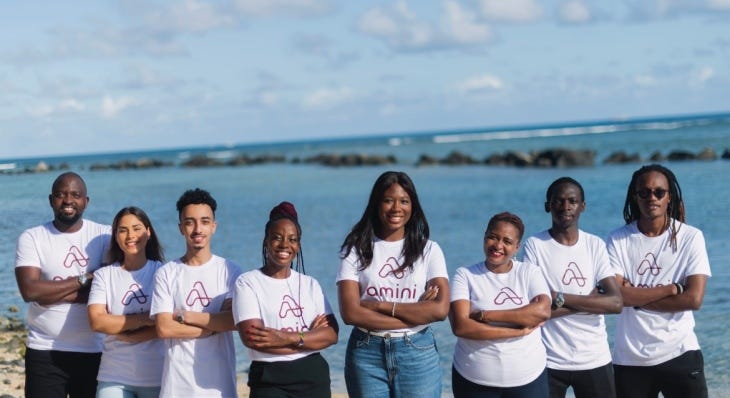Amini, a Nairobi-based climate tech startup, has successfully secured $2 million in a pre-seed funding round to support its mission of addressing Africa’s environmental data gap. The funding round attracted significant attention from investors, resulting in an oversubscribed round. The lead investor in this funding round is Pale Blue Dot, a prominent European venture capital firm with a strong focus on climate-related investments. Other notable participants include Superorganism, RaliCap, W3i, Emurgo Kepple Ventures, and a network of angel investors.
Why The Investors Invested:
The decision of Pale Blue Dot, the lead investor, to invest in Amini was driven by the recognition of a critical challenge: the scarcity of high-quality environmental data in Africa. This data gap poses a significant barrier to developing vital climate solutions, such as improving farmer insurance, monitoring climate risks, and optimizing supply chains. Pale Blue Dot was particularly impressed by the ambition and expertise demonstrated by the Amini team. They firmly believe that Amini is uniquely positioned to fill the environmental data gap in Africa and contribute to driving meaningful change in the region.

A Look at What Amini Does:
Amini, a climate tech startup based in Nairobi, Kenya, is dedicated to tackling Africa’s environmental data gap through the innovative use of artificial intelligence (AI) and satellite technology. The founder and CEO of Amini, Kate Kallot, brings a wealth of experience in AI, machine learning, data science, and deep tech roles from renowned companies such as Arm, Intel, and Nvidia. Mwenda Mugendi, Muthoni Karubiu, and Eshani Kaushal, all members of Amini’s executive team, also have extensive expertise in machine learning, data science, geospatial analysis, and fintech, having worked for companies like as Microsoft, NASA, and MTN.
read also Egyptian Fintech Axis Raises $8.25 Million in Seed Funding to Revolutionize Small Business Banking
Amini’s journey began when Kallot’s work presentation on the convergence of natural capital and emerging technologies sparked her fascination with leveraging AI and ML expertise to address Africa’s lack of data infrastructure, particularly in the realm of environmental data.
To address this data gap, Amini has developed a cutting-edge data aggregation platform that seamlessly integrates diverse data sources, including satellite imagery, weather data, sensors, and proprietary customer data. Through advanced processing and unification techniques, Amini’s platform can provide detailed and granular data at the level of a square meter. This comprehensive dataset is then made accessible to both local and international companies through user-friendly APIs.
The capabilities of Amini’s platform are far-reaching. It empowers farmers by offering them crucial data on various aspects, ranging from crop planting and harvesting cycles to precise measurements of water and fertilizer usage. On a broader scale, the platform enables organizations to gain profound insights into the impact of natural disasters, flooding, and drought across the entire African continent. What sets Amini apart is its ability to leverage almost 20 years of historical data, combined with the regular updates produced every two weeks, providing a comprehensive view of the evolving environmental landscape.
read also United Kingdom Visa Payment Changes for Sierra Leone Applications
Currently, Amini primarily serves corporations and multinationals operating in the agricultural insurance sector and supply chain monitoring. While specific client names remain undisclosed, Amini is engaged in discussions with major players in the food and beverage industry, as well as one of the world’s largest insurance companies, demonstrating the significant interest in leveraging Amini’s services.
Amini’s platform is a game-changer, particularly in addressing the environmental data gaps faced by organizations operating in Africa. It offers much-needed data transparency and aids companies in meeting international regulations related to carbon emissions, environmental impact, and supply chain processes. Moreover, the scalability of Amini’s platform is a key advantage, as agricultural data collected for insurance purposes can also be leveraged by food and beverage companies and governments seeking a comprehensive understanding of the agricultural impact within their respective countries.
In terms of the business model, Amini operates through a longer sales cycle. International clients gain access to the platform’s API by paying a flat license fee for a two-year period. Local clients enjoy tiered introductory pricing based on a case-by-case basis.
Amini Kenya climate. Amini Kenya climate.
Charles Rapulu Udoh

Charles Rapulu Udoh is a Lagos-based lawyer, who has several years of experience working in Africa’s burgeoning tech startup industry. He has closed multi-million dollar deals bordering on venture capital, private equity, intellectual property (trademark, patent or design, etc.), mergers and acquisitions, in countries such as in the Delaware, New York, UK, Singapore, British Virgin Islands, South Africa, Nigeria etc. He’s also a corporate governance and cross-border data privacy and tax expert.
As an award-winning writer and researcher, he is passionate about telling the African startup story, and is one of the continent’s pioneers in this regard
